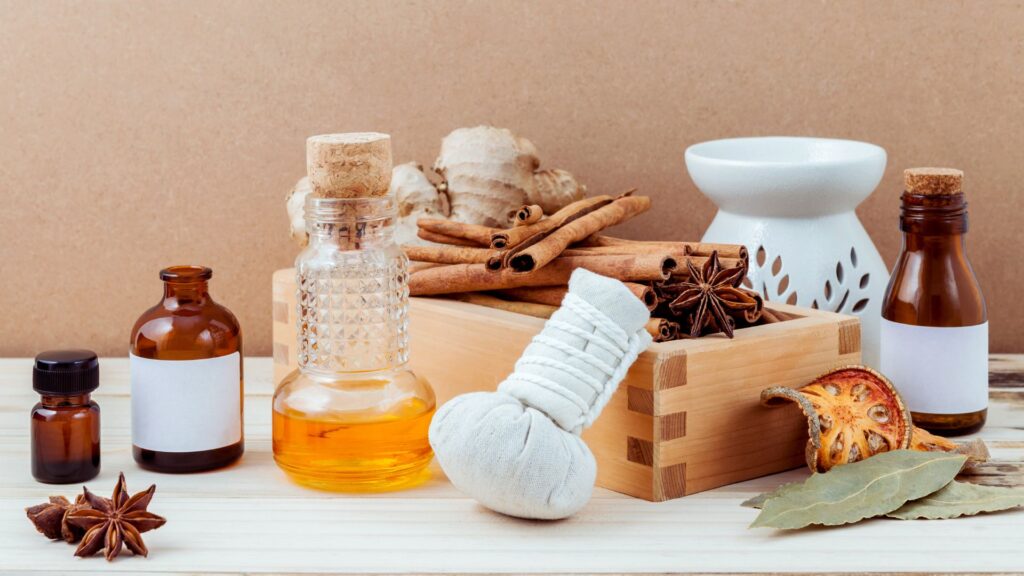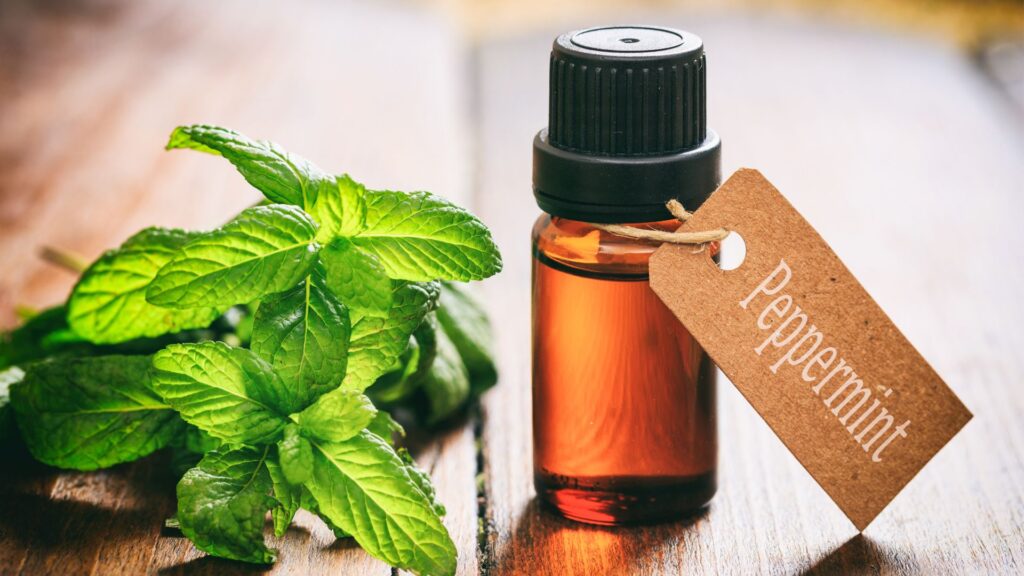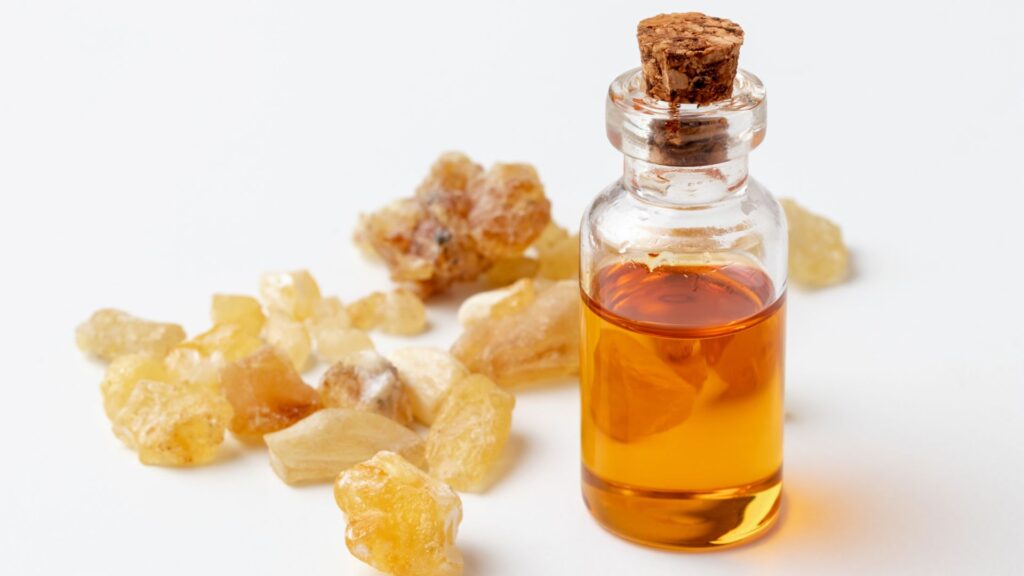
Essential oils hold significant importance in Ayurveda, the ancient Indian system of holistic medicine that dates back thousands of years. These potent oils, extracted from various parts of plants such as leaves, flowers, roots, and seeds, are renowned for their therapeutic properties and are integral to Ayurvedic practices for promoting physical, mental, and spiritual well-being.
Essential oils are believed to possess distinct energetics corresponding to the doshas—Vata, Pitta, and Kapha—fundamental energies that govern the body and mind. Through their unique aromatic and medicinal qualities, essential oils are used to balance these doshas, restore harmony, and alleviate ailments. Essential oils are utilized in diverse Ayurvedic therapies including aromatherapy, massage (known as Abhyanga), and herbal remedies (known as Ayurvedic formulations or Rasayanas).
Each oil is selected based on its specific therapeutic properties, which can range from calming the mind and soothing stress to invigorating the senses and supporting digestion. Essential oils also wplay a crucial role in enhancing spiritual practices like meditation and yoga, as their aromas can deepen concentration, uplift mood, and facilitate emotional release. Additionally, these oils are often incorporated into daily routines such as bathing and skincare rituals, contributing to overall health and vitality.
Each dosha in ayurveda corresponds to different elements and qualities found in nature. The seasons play a significant role in Ayurveda, as they influence the balance of these doshas. For instance, the cold, dry, and windy characteristics of winter exacerbate Vata dosha, while the hot and intense nature of summer aggravates Pitta dosha. Kapha dosha tends to increase during the wet and humid conditions of spring. Ayurveda emphasizes the importance of adjusting one’s diet, lifestyle, and self-care practices according to the changing seasons to maintain equilibrium and promote overall well-being. Different oils are recommended for different seasons according to the qualities of that season. Lets discuss that in detail :
In Summer, the heat increases, and due to its hot and intense gunas, this is a time for Pitta-dominant people to take special care. In general staying cool is the key goal of this season for everyone. Stay out of the midday sun, go for walks in the forest, and bathe in cool streams. With the intensity of the sun and heat during this season, Ayurvedic practitioners recommend specific essential oils known for their cooling and soothing properties.

Peppermint oil is a popular choice due to its refreshing and invigorating scent, which can help alleviate feelings of heat and discomfort. Sandalwood oil is another favorite, revered for its calming and grounding effects, perfect for balancing the fiery energies of summer.
Additionally, lavender oil is highly valued for its ability to promote relaxation and reduce stress, making it ideal for calming the mind amidst the busyness of the season. Incorporating these essential oils into daily rituals such as aromatherapy, massage, or adding a few drops to a cool bath can provide a natural and holistic way to stay balanced and rejuvenated during the summer months. Coconut oil is also commonly used in Ayurveda for its cooling properties. It can be applied topically to moisturize the skin and hair, providing relief from dryness and sun damage. Rose oil has a calming aroma that helps soothe emotions and balance Pitta dosha. It can also be used to cool and hydrate the skin, making it a valuable addition to summer skincare routines.
Winter is characterized by cold, dry, and windy weather, which can aggravate Vata dosha, the elemental force associated with air and space. To maintain balance and nurture the body during this time, Ayurveda recommends certain essential oils known for their warming, grounding, and moisturizing properties. Essential oils such as eucalyptus, ginger, and cinnamon are often favored during winter. Eucalyptus oil helps to clear congestion in the respiratory system, which is common during colder months. Ginger oil, with its warming properties, can stimulate circulation and digestion while providing comfort to achy muscles and joints. Additionally, cinnamon oil is revered for its ability to generate warmth in the body and enhance immunity, making it a valuable ally against winter ailments.
Moreover, moisturizing oils like sesame and almond are highly recommended in Ayurveda during winter to nourish the skin and prevent dryness, a common concern in this season. Massaging these oils onto the body not only helps to keep the skin supple but also calms the nervous system and promotes relaxation—a crucial aspect of winter self-care according to Ayurvedic principles.

Frankincense oil is grounding and calming. It can help to reduce stress and anxiety, which can be heightened during the winter months. Its woody, earthy aroma is soothing and can promote relaxation. Myrrh oil or ‘harad ka tel’ is warming and has antiseptic properties. It can help to soothe respiratory issues, improve digestion, and promote emotional balance. Its rich, earthy aroma is comforting and grounding.
For autumn season, Patchouli oil, ginger oil and frankincesnse oil are grounding and stabilizing in nature and can help counterbalance the dryness and instability often associated with Vata imbalance.
In Spring, Eucalyptus oil may help clear congestion and respiratory issues that may arise during the transition from winter to spring. Refreshing and uplifting, lemon oil can help combat lethargy and stagnation often associated with Kapha imbalance. Stimulating and invigorating, peppermint oil can help alleviate sluggishness and promote mental clarity.
Incorporating these essential oils into daily routines through aromatherapy, massage, or adding them to bath water can provide a holistic approach to staying healthy and balanced during the winter season, aligning with the principles of Ayurveda to nurture both body and mind.
When using essential oils in Ayurveda, it’s important to dilute them properly in a carrier oil and perform a patch test if using for the first time, to ensure there are no adverse reactions. In essence, the importance of essential oils in Ayurveda lies in their holistic approach to healing, where they serve as tools for promoting balance and vitality in the body, mind, and spirit. Their natural and versatile qualities make them invaluable for the well-being and inner harmony in different seasons.